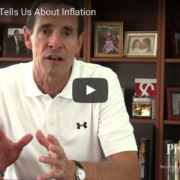Improving Investor Behavior: Investing time now will pay dividends later
The average American spends more than 85 hours per month watching TV. The same person will likely spend about 265 hours sleeping and 228 hours working. Know how much time they’ll spend working on their finances? About 1.8 minutes, (yes, that works out to 96 seconds) per day.
It seems crazy to me that people will spend an hour on Yelp trying to find the perfect taco bar for dinner, but will invest thousands of dollars based on a 30-second spot on the Mad Money TV show. For many households, more time is spent planning a vacation than planning retirement. Vacations last a week or two, but a 30-year retirement lasts 1,560 weeks.
I understand that you may find finance boring, and for many Americans, the picture can be bleak (or even downright depressing). Put those two together, and you get a recipe for procrastination and avoidance. That’s a potent combination. These individuals have no idea how much they spend, what they spend it on, how much (or how little) they save, or how their finances are working in their lives. They may live paycheck-to-paycheck, and either hope to “figure things out later” or throw their hands in the air in disgust over their situation.
On the other hand, I’ve seen people who spend too much time on their finances. They obsess over every minor detail. They love to debate the minutiae on every money matter, most of which are entirely out of their control. They worry about how the government is out to take advantage of them or which geopolitical events are going to bring down the entire financial system. They focus on small things like clipping coupons or finding the gas station that will save them 2 cents a gallon but don’t have a grasp on the big picture items that matter.
One person is so overwhelmed that they never get started. The other is so bogged down with details that they can’t see the forest through the trees. Both get to the same place financially – nowhere.
The reality is nobody really gets educated about money. It is rarely taught in schools, often as an afterthought in some professional curriculum. Most people learn by doing or making mistakes as they go. For something as important as finance, this is a terrifying prospect. Just ask any of those with outrageous student loans. Can you imagine if we educated surgeons or engineers this way with their profession? Finance may not be life or death, but it certainly is freedom or servitude.
Life is busy. The goal is not for you to spend more of your time on your finances. Actually, the opposite is true. Do things that give you emotional, intellectual, and resource deposits, not just financial ones. Ignoring your finances and praying for a financial windfall is not an option, nor is micromanaging your personal finances every single day. Eventually, you’ll either lose your mind, drive your friends and family crazy or mess things up by overthinking and overreacting to things. Activity is easy, but also dangerous. Just look at all the selling by financial companies. They want you to trade. Spending more time on your portfolio doesn’t guarantee success. Mr. Buffett is right: too much thought and activity around your portfolio can be detrimental to your investment performance. He is famous for suggesting people limit their investment decisions to 10 – 12 during their lifetime. It makes you very intentional and careful about your choices and decisions. So what do we suggest?
Take the time to set up a financial plan. Sketch out a potential roadmap and think about where you want to go. Building a plan takes time upfront, but working the plan can be done with a minimal time investment. Take a couple of hours and work through these five things:
- Income and career choice: This is your most important investment. Is it working for you?
- Spending rate: People like this word better than “budget.” Where is your money going?
- Savings rate: Start early and save till it hurts. Let time and compounding work for you.
- Housing: This is typically your most significant monthly expense. We are fans of paying it off as quickly as possible. A debt-free lifestyle is a happy lifestyle with more freedom and options.
- Transportation: This is necessary and expensive. Cars lose value, so limit the resources you put into them.
Have a plan that reflects your goals. Have a system and monitor your progress. Use an accountability buddy if that helps. Find someone you trust to advise you when the inevitable uncertainties arise in life. Pay attention to these five areas, and you will be ahead of the majority of people in America.
From there, managing your finances every month is much easier. We suggest automating as much as possible:
- Automate your bills to avoid late fees and dings on your credit report
- Automate your savings to various accounts (retirement, 529, HSAs, travel, emergencies, etc.)
- Make sure your emergency account stays topped off with 3-6 months of your spend rate
- Use a project account to save for large expected purchases (remodels, Christmas gifts, new car, vacations, etc.)
- Track your spending using any of the available apps (but choose wisely as developers will be able to see your spending and market to you), or using old-school methods like reviewing your bank statements
- Review your progress annually – Have an accountability partner or an advisor who works for you.
Managing your money is nowhere near as exciting as Game of Thrones. But if you take the time to think it through and build a plan, you’ll still have time to catch up on the latest episodes AND be able to one day make work a choice. Improving investor behavior starts not with investments, but with investors. Build a plan, work the plan, and review it once a year. It will pay dividends for you in the years to come.
Steve Booren is the Owner and Founder of Prosperion Financial Advisors, located in Greenwood Village, Colo. He is the author of Blind Spots: The Mental Mistakes Investors Make and Intelligent Investing: Your Guide to a Growing Retirement Income and a regular columnist in The Denver Post. He was recently named a Barron’s Top Financial Advisor and recognized as a Forbes Top Wealth Advisor in Colorado.









